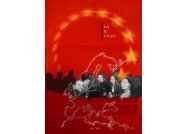turkish-greek civic dialogue - AEGEE Europe
turkish-greek civic dialogue - AEGEE Europe
turkish-greek civic dialogue - AEGEE Europe
You also want an ePaper? Increase the reach of your titles
YUMPU automatically turns print PDFs into web optimized ePapers that Google loves.
4. PUBLIC ACHIEVEMENT (PA)<br />
................................................. Dennis Danovan, Serdar M. Değirmencioğlu<br />
Workshop Leaders<br />
Public Achievement (PA) is a term defining the initiative particularly widespread<br />
in the US to involve youth in <strong>civic</strong> initiatives. In PA participation is on a voluntary<br />
basis. PA enables young people to come together and to work in cooperation<br />
with each other in a democratic manner. PA as a concept, which overlaps with<br />
the concept culture of peace, was presented in the workshop by American and<br />
Turkish PA experts, and was discussed as a model to be applied in furthering the<br />
cooperation and partnership between Turkish and Greek youth. Workshop<br />
participants discussed in groups about the matters they were disturbed by<br />
and they had concerns with; afterwards they prepared projects from these<br />
problematic areas and presented each other the simulations of the projects.<br />
Association des Etats Généraux des Etudiants de L’<strong>Europe</strong><br />
www.publicachievement.com<br />
Public Achievement is an international youth <strong>civic</strong> engagement initiative<br />
for young people ages six to eighteen and older. It gives young people a<br />
framework to learn citizenship skills by doing work of real importance in their<br />
own communities. The simple idea behind Public Achievement is that ordinary<br />
people of all ages have the desires, insights and talents to address society’s<br />
problems and build a stronger community for all of us. With Public Achievement<br />
young people learn the most important lesson about democracy: Democracy is<br />
the work of all citizens, and needs the involvement and talents of all to truly<br />
flourish.<br />
Public Achievement is simple: Young people at schools and in community sites<br />
identify issues significant to them. The issues may range from school-based<br />
to neighborhoods to the global level. Working in small groups each week and<br />
with the help of a coach, young people design action projects that have a real<br />
impact. The team has to avoid any form of violence and use legal methods<br />
to achieve its goals. The coach, who is often a university student or an adult,<br />
guides the groups and helps the young people learn the public skills they need<br />
to implement their own project.<br />
Participation is completely voluntary. Young people work on issues they choose.<br />
Public Achievement projects have been successfully carried out by children<br />
as young as kindergarteners and include such things as creating a community<br />
park, changing school rules and regulations, organizing a high school child care<br />
center, and addressing community violence.<br />
With Public Achievement young people learn how to work together in democratic<br />
groups. They learn how to interact with public officials and others to get<br />
things done. Young people who may struggle in school have the opportunity<br />
to exercise leadership skills. They learn how to be effective with people who<br />
have different viewpoints and values, and they learn how to persevere in spite<br />
of the obstacles they encounter.<br />
Public Achievement helps one learn life-long habits of commitment and<br />
contribution, together with the skills needed to get things done. It helps<br />
teachers, community leaders, and public officials learn about the talents and<br />
interests of young people.<br />
Public Achievement is well-suited for young people who would like to work on<br />
building peace in their own local area and elsewhere. Public Achievement can be<br />
used to build better relationships between Greece and Turkey. In our workshop,<br />
the participants voted and identified three problems they thought were most<br />
important: Prejudice and stereotypes, nationalism and the media. They then<br />
joined a team to work on the problem they thought was most important. In<br />
these teams, we simulated Public Achievement work to demonstrate how<br />
young people can work problems to build better relationships between Greece<br />
and Turkey. Below you can the reports from each team.<br />
TEAM I: NATIONALISM<br />
.............................................................................................................. by Pınar Önen<br />
We were the participants who chose nationalism to work on. We formed a<br />
group and started to work on what kind of action might be possible. Our coach<br />
was Dennis Donovan. We discussed action ideas in a democratic way and tried<br />
to decide which action might be feasible and possible. We decided to take<br />
action in informing and educating people. We preferred to reach many people<br />
rather than to work locally. We thought about interviewing people from both<br />
Rebuilding Communication<br />
61







